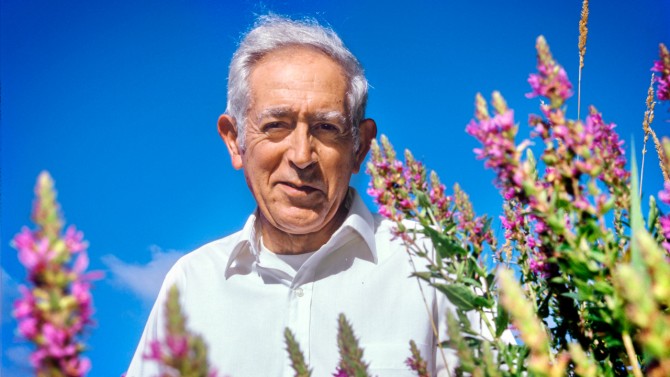Pimentel, professor emeritus and environmental scientist, dies at 94
By Krishna Ramanujan
David Pimentel, Ph.D. ‘51, professor emeritus of agricultural sciences, entomology and ecology, and an influential champion for the environment, died Dec. 8 in Ithaca. He was 94.
Pimentel published more than 700 studies and 40 books, and was a pioneering voice calling for protection of the environment and promoting sustainability. He was the first agricultural researcher to argue against DDT use before it was banned, and his research exposed the environmental and economic limitations of biofuels such as ethanol.
He served on many national and international committees to address issues of sustainability.
“David Pimentel was a significant contributor to the development of ecological perspectives on campus,” said Paul Feeny, professor emeritus of ecology and evolutionary biology. “He was responsible for initiating the first course in introductory ecology (now BioEE 2610), which was wildly popular during the ‘Earth Day’ era of the late ’60s and early ’70s. He was ahead of his time recognizing ways that species’ can affect each other’s evolution, thereby contributing to an explosion of research on ‘co-evolution’ between species.”
Pimentel was born in Massachusetts in 1925 and raised in Fresno, California. After serving in the U.S. Air Force during World War II, he received his bachelor’s degree from the University of Massachusetts, Amherst, in 1948 before earning his doctorate in entomology from Cornell in 1951.
He was called back into government service in 1951, but transferred out of the Air Force and into the U.S. Public Health Service, where he served as chief of the Tropical Research Laboratory in San Juan, Puerto Rico. In 1955, he joined Cornell’s faculty as an assistant professor of insect ecology. He became a full professor and head of the Department of Entomology and Limnology in 1963.
“As an energetic and proactive department head, modest about his own accomplishments, he fostered a greater sense of cohesion and collaboration among the faculty and with other departments,” Feeny said. “In addition, he hired faculty engaged in both basic and applied research to build one of the most respected entomology programs in the country.”
In 1976, he added the title of professor of agricultural sciences in the Section of Ecology and Systematics. He retired in 1998 as a professor emeritus but continued to teach, conduct research and publish papers.
Pimentel’s research findings at times contradicted conventional wisdom. His 1997 report on livestock production found that if all the grain eaten by livestock were instead fed to humans, the United States could feed 800 million people.
Stemming from his work as chair of a U.S. Department of Energy panel to investigate energy efficiency, economics and sustainability of ethanol production, Pimentel reported that biofuel made from corn, soybeans and sunflowers uses far more energy to produce than the resulting ethanol or biodiesel generates. And in a 2005 paper in Bioscience, he concluded that yields from organic corn and soybean farms are equal to those from conventional farms, but use 30% less energy, less water and no pesticides.
Other work investigated the need for better soil and water conservation, and for human population control and resource management.
Pimentel chaired and served on many boards, panels and presidential commissions and committees; their work included investigations into solar power, genetically engineered organisms, soil conservation, malaria prevention, Earth’s capacity to support human populations, environmentally harmful chemicals and environmental refugees. He served as president of the Rachel Carson Council, and on the boards of the National Geographic Society and the National Academy of Sciences.
He was elected to the Audubon Society and the American Institute of Biological Sciences. In 2007, the University of Massachusetts, Amherst, awarded him an honorary doctorate.
Pimentel is survived by his wife of 70 years, Marcia, and three children.
Gifts in memory of Pimentel and his work can be made at the National Geographic website. For check donations, please include “In memory of David Pimentel” on the check and mail to: National Geographic Society, 1145 17th St. NW, Washington, D.C., 20036.
Media Contact
Get Cornell news delivered right to your inbox.
Subscribe

